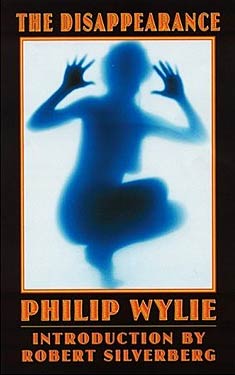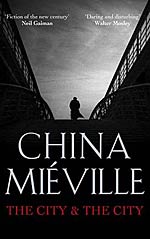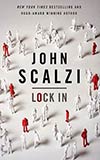Can Science Fiction Anticipate the Future of Gender?
Will the current concepts of male and female exist in the future? SF writer have no trouble seeing horrible futures, like The Handmaid’s Tale. So, can science fiction writers imagine desirable futures? Especially, when it comes to future gender roles? We’re seeing more stories like Too Like the Lightning, Ancillary Justice and Lock In where science fiction anticipates new views of gender. I just read The Disappearance by Philip Wylie, that rethought gender roles in 1951. Wylie wasn’t totally enlightened by today’s standards, but he saw women had far more abilities than society allowed. How much did Wylie get right? And how much can today’s SF writers get right about our future?
Is it possible for science fiction to imagine a gender equal society? Or, must we always examine the problem through dystopian failures? We assume we’re progressing towards more equality because of the changes we’ve already undergone. So how come we don’t see more positive futures in science fiction? Will we ever create a society based on individual equality? Ada Palmer explores such an idea in Too Like The Lightning.
I’m getting so tired of dystopian science fiction. I know novelists need conflict to forward their plots, but can’t they imagine conflict in a superior society that gives readers hope for the future? I want to believe in futures where killings like in Orlando never happen, and men like Jessica Valenti describes in Sex Object are as rare as dinosaurs. Can’t science fiction envision a tomorrow without all the things we hate about ourselves today? We don’t need unrealistic utopias or childlike fantasies, but more hope would be appreciated.
Do we assume since misogyny has always existed, it will always exist? I just read When Everything Changed by Gail Collins, that shows how the U.S. was dramatically transformed from 1960-2008 by women’s rights. Philip Wylie would have been gratified by Collins’ report.
 The Disappearance tried to convince its readers to think different about women. Wylie anticipated attitudes that wouldn’t surface until the late 1960s. His novel is dated, yet feels relevant because our society still lacks equality. It seems tragic we can’t imagine better societies, but still have engaging conflicts for characters and readers. Star Trek might be one positive example, but was it?
The Disappearance tried to convince its readers to think different about women. Wylie anticipated attitudes that wouldn’t surface until the late 1960s. His novel is dated, yet feels relevant because our society still lacks equality. It seems tragic we can’t imagine better societies, but still have engaging conflicts for characters and readers. Star Trek might be one positive example, but was it?
We identified most gender issues long ago, but there’s some kind of barrier to solving all of them. We can ask why everyone in the 19th century didn’t see the evils of slavery. What will 22nd century people condemn us for not seeing that’s obvious to them but not us? Can science fiction writers be the new abolitionists? I’m not sure making more female characters into protagonists does the trick.
Wylie made conceptual leaps in 1951 that we’ve come to accept. Women now work at jobs that would have been unbelievable then. What will it take for us to think equally far out of the box? Most men today believe women can do anything they want, but they still see women as sex objects. Can science fiction imagine societies where humans have free will to escape their biological programming?
How many readers changed their attitudes about women by reading The Disappearance in 1951? If science fiction can imagine us solving our problems in the future, can reading it change us now?
The Disappearance uses a clever plot gimmick to explore gender issues and feminism. In the first chapter, at 4:04:52 p.m., all the women disappear from Earth, and the story begins describing how men live without women. In the second chapter, at 4:04:52 p.m., all the men disappear, beginning a second story sequence describing how the women live without men. Wylie anticipates many feminist issues that wouldn’t be recognize until decades later. He’s a tiny bit progressive with his views on homosexuality and race, but falls far short of what we know. Wylie was ahead of his time — but not all of him.
We can never know when science fiction is right about the future, but won’t contemplating more possibilities enlighten us?
Wylie gives us Dr. William Percival Gaunt, philosopher, writer, competent man (much like Heinlein’s Jubal Harshaw, but without being an ass). Gaunt becomes the central figure in the story about males. Gaunt’s home is near Coral Gables and Coconut Grove, Florida. I was born in 1951, and grew up in Coconut Grove and Coral Cables, so this novel was especially meaningful to me. In the other half of the twin plot, Paula Gaunt, Bill’s wife, is a competent woman who becomes the leader of a small group of women. Both of the Gaunts eventually travel to Washington to help decide the fate of the nation.
Like the novel The City & The City by China Miéville, the men and women occupy the same physical space without seeing each other, but their realities diverge, because the men and women react differently to the same event. Their worlds eventually become two very different places.
 Modern SF writers like Ann Leckie and Ada Palmer explore the future of gender today. If their ideas become common in the future, will future readers consider their books classics? Because Wylie gets much wrong, I’m not sure The Disappearance is a classic. Wylie felt men wildly underestimated the potential of women, but ultimately theorizes it takes a male and a female to make a whole person. We, of course, would consider that silly today.
Modern SF writers like Ann Leckie and Ada Palmer explore the future of gender today. If their ideas become common in the future, will future readers consider their books classics? Because Wylie gets much wrong, I’m not sure The Disappearance is a classic. Wylie felt men wildly underestimated the potential of women, but ultimately theorizes it takes a male and a female to make a whole person. We, of course, would consider that silly today.
Wylie felt women could do they same jobs as men, had the same sexual drive as men, thought women had been falsely imprisoned by society’s expectations and roles, but he couldn’t imagine women being 100% independent. He thought men and women needed each other, and considered non-heterosexuals as misguided. Our modern view of gender and sexuality assumes everyone is equal and independent. We see gender and sexuality as important traits for identity, but differences that don’t cause inequality. We’re moving away from marriage as a bond between an unequal male and female, to a legal contract between equal individuals. But isn’t that just a start? Won’t gender roles in society be vastly altered by current trends? Can science fiction imagine those changes?
Wylie follows Plato by suggesting that man and woman are half-a-soul that make one gestalt soul. That’s where this novel idealistically fails, but I have to give Wylie tremendous credit for seeing things very differently from the 1951 normal. When Everything Changed was the perfect book to read after The Disappearance. Gail Collins’ book magnificently shows how much things have changed. I’m not sure Wylie could foresee his ideas playing out. Sex Object would have blown his mind, but not all of it.
There were 1970s feminists who advocated changes to society that would eliminate the ways we make women into sex objects. They were labeled radical, and the reaction against them helped generate a wave of anti-feminism, which also turned many against the ERA. Our society has become hypersexualized since then. Can science fiction writers imagine societies where we don’t objectify each other and still have healthy, rewarding sex lives? To many 1970s feminists we’ve gone backwards.
Any science fiction written today that shows how we outgrow gender might seem prophetic in the future if we eventually erase those traits. I think that’s what Ada Palmer is showing in her novel. Her characters claim “she” and “he” are outmoded concepts, but are sometimes used for the convenience of the 21st century reader to understand the 25th century. But the narrator explains that’s even deceptive for our primitive minds. Because sometimes the narrator will call someone a he, but only mean that person has male traits, but not necessarily male biology. As science fiction writers are discovering, getting rid of gender pronouns are difficult. Will any personality traits be considered masculine and feminine in the future? Does Palmer go far enough?
Do such science fictional speculations suggest future humans might also get rid of sex? Can we, or the science fiction writers of today, imagine future males and females with no unique gender roles? Or gender disappearing from language?
Sex Object, is a feminist memoir that beautifully illustrates the problem of sexual objectification. How could science fiction writers take the problems Valenti describes and create a fictionalized enlightened future that solves them? Valenti wants society to process out the repugnant aspects of seeing or being objects, but she doesn’t know how. Is that our future? Finding politically correct ways of pursuing sex and romance?
In the past, science fiction was mostly about traveling into space. Today, science fiction is often about staying home on Earth. We may even stop talking about men and women. Those labels might become essentially meaningless. Can writers create stories where readers comprehend gender equality? I just bought The Fate of Gender: Nature, Nurture, and the Human Future by Frank Browning. That makes me wonder what nonfiction books inspired Philip Wylie.
Do science fiction writers actually imagine new concepts, or do they observe them beginning in society, like the dots in the yin and yang symbols?



















 Full Details
Full Details






3 Comments
Hi James, interesting article, as usual.
I think you misrepresent ‘The City & The City’: I don’t think it has anything to do with gender whatsoever, the two cities are different politically, not by way of gender. (Or maybe I misread that book entirely?)
As for recent SF that is not dystopian but does envision a ‘gender utopia’: Ian M. Banks’ Culture novels are often forgotten – which is strange, given their popularity.
The Culture novels envision a totally egalitarian society, where your gender doesn’t matter one bit, just as it doesn’t matter wether you are a robot, an AI-entity or whatever hybrid. Every kind of gender permutation is allowed and a lot of different ways of being exist, going from neutrals to men that get surgery and add 25 penisses, with 4 additional hearts to keep the blood pressure up to get those all erect at the same time. Sexual mores in the Culture are totally free.
What is also very interesting is the concept of self-instigated sex change: in the Culture, people can control their hormonal glands just by thinking, and so are able to change their sex in about 6 months just by willing it. Most people tend to do so for periods of time (average lifespan in the culture is about 4 centuries), amongst other things to experience crucial parts of the other sex (like men becoming women for a couple of years to experience childbirth).
There’s more to it, Banks’ visions are quite intricate, and I would just advice people to start reading asap, if they are not familiar with the books.
What is remarkable is that while they are (de facto) much more gender progressive as lets say Leckie’s trilogy, they got a lot less gender buzz, if any. That probably has to do with the fact that Banks is male himself, and that at the end of the 1980ies, when the Culture novels originated, it was not as hot a topic, and by 2012, when the latest Culture novel was published, everybody was used to the Culture, and it didn’t have any novelty value anymore.
bleebs, I was only using The City & The City to describe how two groups of people occupy the same apparent world.
I’ve really got to start reading the Culture novels. I hear about them all the time. For some reason I’ve never have. I tend to avoid books in series, but I’ll try Consider Phlebas because of your recommendation.
Should it might convince you more: each book stands on its own… totally different characters, different story, they are just set in the same universe. I’d start with ‘Player Of Games’ (the second one), as that is quite short, fun and accessible. If you like that, the most logic thing to do is to just read them in publication order afterwards, but that’s not really necessary.
My favorite is ‘Excession’, and ‘Consider Phlebas’ is my least favorite. ‘Inversions’ is also listed as a culture novel on this site, but it’s not fully, and it wasn’t marketed as such.
About The City&The City, yes, I see that now, I should have read more carefully, sorry.
Sorry, the comment form is closed at this time.